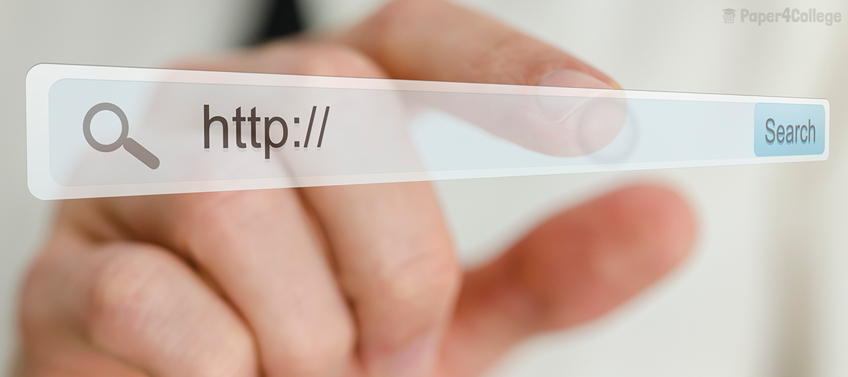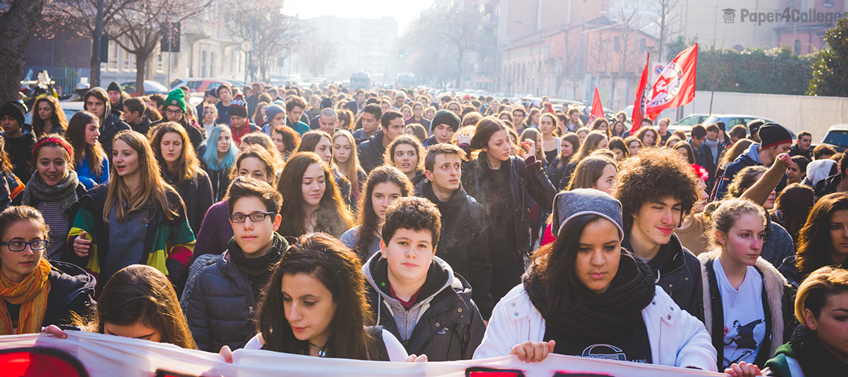On Debating Copyright in the Internet: The Story About Online Pirates

Let’s remember what we know about all those incredibly useful and helpful things without which we can hardly imagine our everyday life in the 21st century. Of course, we should thank Thomas Edison for inventing an electric bulb. Alexander Fleming would definitely deserve our attention for his discovery of penicillin. Probably, you can even name the people who created the very first refrigerator or computer. And what about the Internet? Don’t you think that most of us have hardly any clear knowledge of when and how it appeared? Besides, are we sure that we understand the main principles and mechanisms of its functioning?
You see, the thing is that people (undoubtedly, they were true geniuses) who initially came up with the idea of something that was actually destined to become the World Wide Web, couldn’t predict how inclusive and influential it would turn out to be. Just take this online paper writing service as an example: probably only a very strong optimist and romantic was able to presume that such services would exist at all. What is more, neither the numerous opportunities offered by the Internet to its users today, nor any of the dangers it poses to ordinary people and even to countries could be foreseen at that time.
I believe there is no need to list the advantages and threats each of us faces when asking Google (or any other search engine) for help. What is quite convenient about these two aspects is their obviousness: you can differentiate them from one another more or less easily. However, we are going to talk, or it’s better to say to debate about one topical and very controversial issue which involves not only the technical facet of the Internet, but also the spheres of law and human rights in general, tending to get more and more serious in recent years.
So, copyright online is the main focus of our discussion. We will try to look at it from different, even opposite angles and do it as impartially as possible in order to closely consider various sides of the following controversy: whether the access to things like musical compositions, videos (including films), books and other materials, which can be related to what we call “intellectual property”, should be free or not.
Let’s move to the conclusion according to the following plan:
- firstly, we need to specify what exactly copyright is as well as why and how it has become such a rich source of international debates;
- secondly, we will analyze the opinions of those who support the idea of free access to any kinds of works and materials even when their author is known and alive; particular attention should be paid to the so-called pirate parties, and we are going to discuss their position in detail;
- thirdly, we will refer to what the opponents of such idea say and the arguments they provide: this can help us see the whole picture and evaluate the real scale of the problem;
- in the end, we will sum up all the opinions and try to reach a reasonable agreement.
Intellectual Property in the Digital World: What Is It

Putting complicated legal terms aside, the notion of intellectual property can be explained simply as any material thing which is new and original and which you create yourself with the help of your knowledge, skills, talents, etc. Have you ever written a poem? Well, even if this sheet of paper with a dozen of rhymed lines on it lies in the darkest drawer which can be found in your house, it can and must be considered a piece of your intellectual property. You are the only author of this text and only you have the right to publish it in the local newspaper or post it on Facebook.
And this is where the whole thing starts. I am one the authors working on this online paper writing service and having my personal blog as well, so I know what I’m talking about.
Let’s assume that you are really satisfied with the aesthetic value of your poem or, maybe, photo, so you have decided to post it on your wall in the social net you prefer most of all. On the one hand, there is nothing wrong or bad about sharing your creativity with all your friends, especially when it does deserve to be viewed and evaluated by other people. On the other hand, now literally every user of this social net (you remember that there are millions of accounts on Facebook, Twitter, and the like) has free access to it.
What can this user do?
- He/she can simply repost your poem, photo or whatever it is, mentioning that you, its author, is a nice person. This is what each of us does almost every day and there seems to be nothing catastrophic about inoffensive reposts. To some extent, it is true.
- He/she can copy your text or photo without mentioning that you are its real author and post it on his/her own wall. Of course, it isn’t very pleasant to discover such issue. However, as long as no commercial purpose is implied, you can resolve it quite quickly and painlessly, without taking serious measures.
- The last thing he/she can do is certainly the meanest: imagine that the photo you took and processed so beautifully was not just copied by someone, but sold to a newspaper or magazine for some money. Of course, your reaction to this situation would depend on how mercenary you are (here I’m using this word in a positive sense), however it can’t be considered normal and fair (this money could have been yours, so take this fact into account).
So, you see where the debates over online copyright take their roots from. The example with the poem and photo is quite primitive, I admit it, though the situation I have mentioned in the end is still very likely to happen. The worst thing about it would be the difficulty of proving your authorship if you decided to bring this case to court somehow.
Now imagine that the kind administration of some green online paper writing service provides free access to original samples of various academic works. I guess, you can predict which problems such company and, what is more important, its customers will face. Partly because of these unpleasant probabilities special measures are taken to protect the company’s property and its writers’ work from any illegal actions from any side. For instance, a user may be requested to register on the company’s website and receive the samples as its current customer, who must provide certain personal and contact information.
Yet, basing only on the mentioned issues, without researching into the cases of really severe copyright infringements in detail, we can come up with the main questions to which the quite long-lasting debates have been trying to give definite answers for many years already. Let’s specify them now in order to understand how well the arguments of “online pirates” and their opponents, which we are going to discuss below, work and how rational they actually are.
- Should special regulations generally try to maintain strict control over the rapid spread of various kinds of digital files, which have official authors and/or owners, across the Internet?
- Should the law protect the intellectual rights of the authors who share the products of their creative activity in the World Wide Web without commercial purpose and without documented confirmation of their authorship?
- (The question is related to the previous one.) How can bloggers protect their rights and what to do in the case when the blog belongs to the company (even if it is an online paper writing service or online store)?
- Should it be allowed to share links to the original contents, for example through social nets?
- Should the Internet users really pay for getting access to online music and movie services or to online libraries and archives, as well as for downloading the respective files from their websites? If yes, then how much should such access cost?
Alright! It’s time to explore different points of view!
Who Are Online Pirates and What They Say

It’s not without a reason that the phenomenon of online piracy received such name. At the moment, it is widely considered as a type of cybercrime that involves copying and spreading different kinds of copyrighted materials through the Internet illegally. Despite the fact that a modern online pirate won’t be publicly hanged as many centuries ago, still punishments for especially severe infringements of authors’ intellectual property rights can include even imprisonment.
Indeed, speaking roughly, online piracy in its essence implies theft of audio and video files as well as of software, that is the theft of absolutely real material things. Regardless of whether the pirate wants money for spreading the illegally acquired files in large quantities or it is just his/her sincere and absolutely disinterested aspiration to make a good thing available for others, the actions of this person are claimed to violate copyright anyway.
However, online pirates, who not only admit that they pirate books, movies or music but acknowledge themselves as members of the so-called pirate parties (by the way, nowadays these organizations have legal though non-governmental status), seem to have somewhat different opinion on the issue. Let’s learn more about these guys and see how they may treat such things as an online paper writing service and online library of the world’s best university.
Some History
According to the information provided by Wikipedia, the very first Pirate Party was established by Rick Falkvinge, who is a Swedish IT entrepreneur at present, in 2006. It is quite difficult to speak about some significant achievements of his team, but the party and its ideas laid the considerable groundwork for the development of general and clear principles advocated by their proponents and followers. After four years, in 2010 Pirate Parties International (or PPI) was officially established in Brussels, Belgium.
4 Main Pirates’ Policies
You know, if you have a look at the general ideas of online pirates putting aside various political, social and economic consideration for a while, they will seem to you rather romantic and even utopian, to some extent. Just judge for yourself.
- Freedom: these guys actually stick to the human rights of free self-expression, equality in communication and education, privacy, free sharing of knowledge and ideas, etc.
- Openness: this policy implies open access to information and data, and it initially appears to be probably the most controversial issue that just keeps adding fuel to the fire of the debates. By the way, in its turn, it can’t but concern the problem of data security in different online companies including not just online paper writing services for students but also online banking or different types of online payment operations.
- Nonviolence: online pirates are against any possible kind of violence and discrimination in the Internet.
- Legitimacy: it’s very important to highlight that pirates claim to strive for defending and supporting reforms of intellectual property right and patent laws on the political level.
Armed with Counter-Arguments: Why Listen to Them

Although the mentioned principles are rather optimistic, nothing is as easy in the issue of protecting online copyright as it seems. There are quite a lot of people, and among them there are representatives of states governments, who don’t consider the free access to information and materials to be such a bright idea for the near future. And their arguments don’t lack rationality.
It Would Threat Creativity
Let’s be honest. A famous writer or singer can still get money from the sale of his/her books or tickets for a concert respectively despite the fact that the final and unique product of his/her creativity has been copied illegally. But what about young beginners, who do have the right to sell their works as well? What is more, they must be interested in doing so, because someone else can suddenly pocket not only their well-deserved fame, but also its material equivalent. The latter can turn out to be a very powerful reason why beginners refuse to continue with their creative activity.
It Could Have Negative Effects on Particular Organizations
Of course, there is a number of organizations and companies which aim to officially protect copyright of real authors in the Internet. And what if such company can’t carry out its responsibilities anymore due to uncontrolled piracy? Becoming a part of a more powerful organization is the most painless way out of the situation, however there are hardly any guarantees for it.
It Would Pose a Real Danger to Privacy
This all is about both an author’s and a user’s safety. There is actually almost nothing to be afraid of in terms of such services as online shopping or the online paper writing service, but what will you say about websites with free music or movies? Some of them may also request their visitors to provide their personal data. The question is why they need it.
Instead of the Conclusion: Important and True Anecdote or Where the Shoe Pinches
Finally, get ready to hear the shocking news which will definitely help you understand why the issue of online copyright is so complicated.
In 2012 Julia Schramm, the member of the German Pirate party, published a book called “Click Me: Confessions of an Internet exhibitionist”, which was rumored to disapprove the idea of intellectual property right and consequently became very popular at once. But the file with the book appeared to impossible to download for free – the copyright protection measures did their work.
So, the issue remains open. The more developed security measures become, the more sophisticated the methods to break them are invented. Time will show. And for now it’s just your moral choice to pirate or not.
